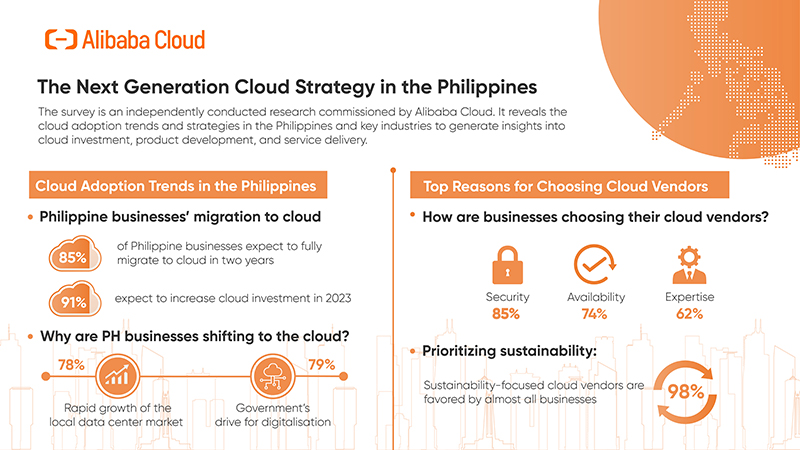Most businesses in the Philippines are expecting to increase their investment in cloud adoption in 2023, according to a report from a technology company.
Alibaba Cloud, a cloud computing company under the Alibaba Group, released a report titled “The Next-Generation Cloud Strategy in Asia” that showed the cloud adoption trends of business entities in several countries in Asia this year.
Since the COVID-19 pandemic, Asian countries have been adapting to shift to digitize regular operations both in the public and private sectors.
These included the gradual adoption of the cloud or in simpler terms, the internet.
“Simply put, the cloud is the Internet—more specifically, it’s all of the things you can access remotely over the Internet. When something is in the cloud, it means it’s stored on Internet servers instead of your computer’s hard drive,” the definition from an online learning website reads.
What the data shows
Its data showed that 91% of businesses in the Philippines have expressed plans to invest in cloud adoption.
This placed the country among the top five countries in Asia with a high interest in cloud adoption in the business sector.
The top five Asian markets are:
- Thailand at 95%
- Indonesia at 94%
- The Philippines at 91%
- Hong Kong Special Administrative Region at 83%
- Singapore at 83%
Alibaba Cloud also found that 85% of local businesses have plans to fully migrate its data to cloud technology in the next two years.
The businesses surveyed also listed the following reasons why they are either eyeing to adopt or fully adopt cloud infrastructures:
- The rapid growth of the local data center market
- National government’s plans to digitalize the Philippines
On choosing cloud vendors, nearly all, or 98% of local organizations consider sustainability as among their criteria.
The other deciding factors are:
- Security
- Availability
- Expertise

The survey in the report was generated from 1,000 organizations across industries. These include financial services, IT, manufacturing, media and telecommunications and retail.
Participants came from eight countries, including the Philippines, using cloud services.
Alibaba Cloud commissioned the global market research firm NielsenIQ to conduct the survey.
Three big companies are current users of Alibaba’s cloud services. These are Globe Business, GCash and the Asia Pacific College.
Drivers of the cloud adoption
Executives of GCash and Globe Business list the following key drivers for local organizations to adopt or migrate to cloud services.
These are:
- Availability
- Security
- Cost flexibility
- Equalizing the playing field
Kristofferson De Ocampo, field chief technology officer for Cloud and Cybersecurity at Globe Business, said that information and technology services are often underrated, yet are critical to business operations.
“We’re one of those industries that can’t just go offline. We’re like a bank,” De Ocampo said in a forum.
“If something goes wrong and people can’t call, there’s a big problem. So availability is up there. It’s number one. It has to be available first. And it has to be secure,” he added.
Greg Igaya, vice president for Technology and Development and Operations at GCash, also added “cost flexibility” as a driver of cloud adoption.
“Cost flexibility. It’s giving a lot more options in which how much do you wanna scale this,” Igaya said.
The GCash executive also explained how cloud services can “equalize” the playing field between small and large business organizations.
“One of the deciding things about adopting the cloud is it allows smaller players, smaller start-ups, or SMEs to engage toe-to-toe with other players. This is very important. Even though GCash has been very successful, we don’t take that position for granted. It has its advantages, and it equalized the playing field among players of larger companies or market leaders–it keeps them on their toes,” Igaya said.










